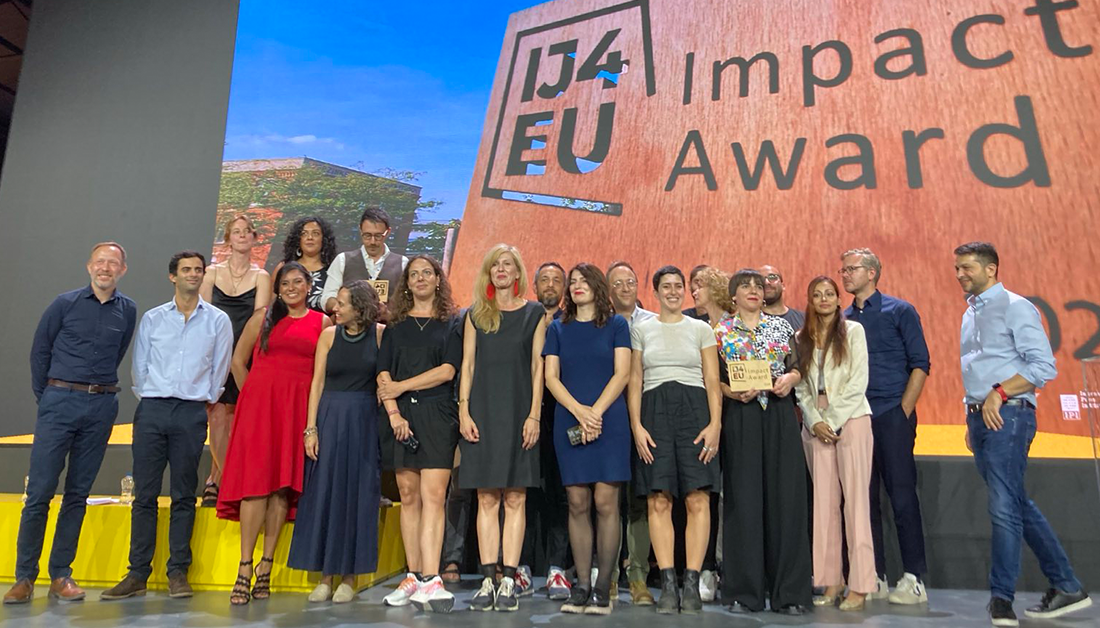From a forensic look at a catastrophic shipwreck to the exposure of global disinformation networks and a search for unmarked migrant graves across Europe, remarkable examples of collaborative journalism shone at the IJ4EU Impact Awards 2024 on Thursday.
Three international teams of journalists received equal recognition at the annual prize of IPI’s Investigative Journalism for Europe (IJ4EU) fund, which supports cross-border watchdog reporting.
The winners were (with no particular ranking):
The jury also gave an honourable mention to Suspicion Machines.
“I know I speak for the rest of the jury when I say that so many of the entries were of an outstanding quality,” Maltese investigative journalist Paul Caruana Galizia, who chaired the jury, said.
“A reminder, as if we needed one, that there are many journalists out there working — sometimes on a shoestring, sometimes at risk — on stories that are important, in the public interest and have the power to affect change.”
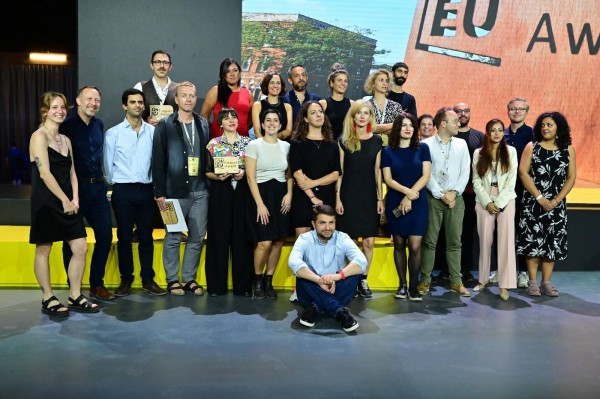
Powerful collaborations
The winning investigations were announced during a ceremony at IJ4EU’s annual UNCOVERED Conference, hosted at the iMEdD International Journalism Forum in Athens on September 26, 2024.
An independent jury chose the following investigations from a shortlist of nominations for Europe’s only prize devoted to celebrating journalistic collaboration across frontiers:
The winning teams received cash prizes of €5,000 each. The jury was unanimous in its decision.
Along with Caruana Galizia, the jury members were pioneering documentary maker Christopher Hird; Gabriela Manuli, deputy director of the Global Investigative Journalism Network; award-winning Kosovo journalist Saranda Ramaj; and Nik Williams, a media freedom advocate who co-chairs the UK Anti-SLAPP Coalition.
The winners topped a shortlist created after an exhaustive evaluation of nominated investigations led by experts at the Institute of Communication and Media Studies of Leipzig University.
Here is more information about the winning investigations.
The Pylos Shipwreck
This investigation by Solomon, Forensis, The Guardian and ARD forensically examined a 2023 shipwreck that killed more than 500 irregular migrants in Greek waters. The jury praised it for its innovative storytelling.
By exposing failures in the official responses, the project has had a significant impact in Greece, contributing to a compelling case that is now part of ongoing court proceedings.
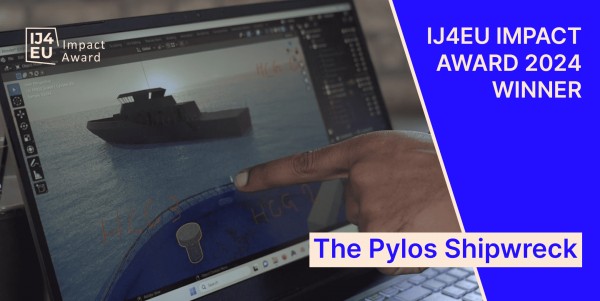
With an interdisciplinary approach incorporating forensic modelling, the jury said the team demonstrated exceptional cross-border collaboration and swift execution, interviewing affected families and producing a powerful video.
Story Killers
Story Killers is a global exposé by Forbidden Stories revealing the shadowy world of disinformation mercenaries. What sets the project apart is its focus on the experiences of journalists who risk their safety to report on this perilous industry.
The jury commended the team for painting a profound picture of the landscape of disinformation, surveillance and press freedom.
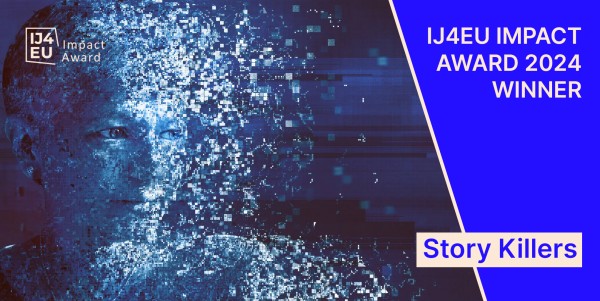
Forbidden Stories is an international network of journalists operating under the motto: “Killing the journalist won’t kill the story.” For this project, Forbidden Stories brought together more than 100 journalists from 30 media outlets for a unique collaboration.
One of the journalists whose work Forbidden Stories continued was Gauri Lankesh, who was assassinated in Bangalore in 2017, days before she planned to publish an article about disinformation.
“By continuing Gauri Lankesh’s important work, not only did Storykillers uncover the global disinformation complex that threatens free expression and democracy in every country across the globe beyond India alone, they shone a light on Gauri’s tragic death,” jury member Williams said.
“Through that, they also honoured her courageous life.”
The Border Graves Investigation
In an effort to uncover the fate of irregular migrants who perish attempting to reach the European Union, eight freelancers identified more than 1,000 unmarked graves in 65 cemeteries across Europe.
The jury lauded the team’s humane approach and strong visual storytelling that relied on powerful photography and virtual reality, complementing the investigative work.
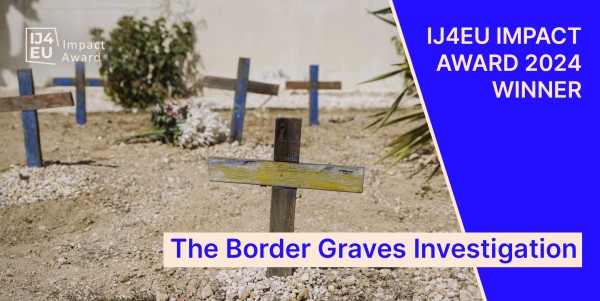
The freelancer team brought attention to an underreported issue and highlighted the failure of EU migration policies and the right to truth for hundreds of affected families.
The jury also acknowledged the investigation’s contribution to transforming public understanding of the issue. The Border Graves Investigation is the only winner this year who has received IJ4EU funding.
The jury also acknowledged the investigation’s contribution to transforming public understanding of the issue. The Border Graves Investigation is the only winner this year who has received IJ4EU funding.
“This project is a perfect example of how to do investigative journalism with boots on the ground, while shining a light on individual stories and humanising victims,” jury member Manuli said.
“What makes it more exemplary, is that it was conducted by a very small cross-border team. Out of the eight reporters, six of them are full-time freelancers, and the other two are affiliated with small newsrooms. And all this significant reporting was done with very little resources, in a period of over six months.”
Suspicion Machines
Lighthouse Reports , a winner of last year’s IJ4EU Impact Award, earned an honourable mention for its Suspicion Machines investigation into inscrutable algorithms.
The Dutch non-profit collaborated with newsrooms across Europe to uncover the discriminatory effects of welfare surveillance algorithms and highlight the lack of transparency in how governments deploy these secretive AI systems.
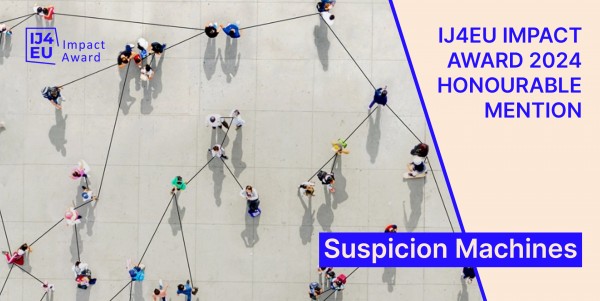
The jury praised the project for its impressive methodology, setting a new standard for data journalism by effectively blending investigative reporting with tech-driven approaches.
Seeking truth across borders
The IJ4EU Impact Award honours journalistic teams collaborating across borders in countries that have signed up to the full cross-sectoral strand of the European Union’s Creative Europe Programme, which provides core funding for IJ4EU.
The award is open to teams regardless of whether they have received IJ4EU grant funding.
Managed by the European Centre for Press and Media Freedom (ECPMF) in cooperation with IJ4EU partners the International Press Institute (IPI), the European Journalism Centre (EJC) and Arena for Journalism in Europe, the prize accepted nominations for investigations published or broadcast between October 1, 2022 and December 31, 2023.
IJ4EU’s mission is to strengthen cross-border investigative journalism through grants, legal help and other forms of support in and around Europe.
Led by IPI, the IJ4EU programme is financed by the European Commission with co-funding from Fritt Ord Foundation, Isocrates Foundation, the Free State of Saxony and the City of Leipzig.
The IJ4EU consortium extends its congratulations to the winning teams for the well-deserved recognition.
The journalists’ work underscores the importance of cross-border investigative journalism in revealing truths that extend beyond national borders and holding those in power accountable, playing a pivotal role in promoting transparency and justice across the world.
